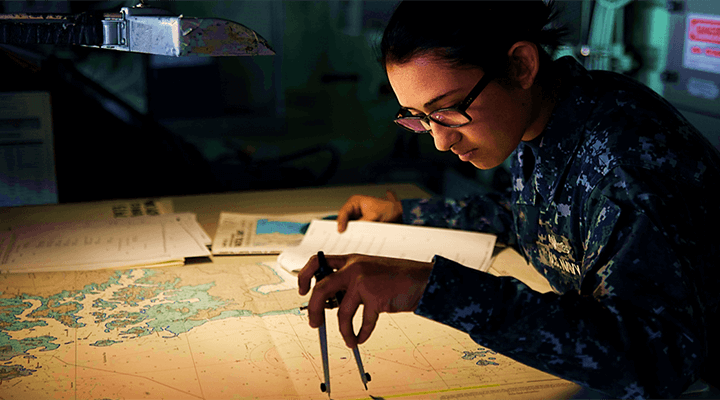In this part on our series on Military Occupational Specialties and Security Clearances, we look at a sampling of jobs in the Navy. The Navy does things a little different in that they have potential enlistees fill out a security clearance form, the Standard Form 86 – Questionnaire for National Security Position – before they enlist … even if the job they are enlisting for does not require a security clearance. While a waiver may be granted for some issues, other things may not; it just depends on what it is.
Even if you’re unable to obtain a security clearance, you may still be able to enlist into one of the ratings not requiring a clearance. Some of main rating categories generally not requiring a clearance include:
- Administration
- Aviation
- Medical
- SEABEE
- Supply
- Surface Combat Systems/Operations
- Surface Engineering
If the rating field is in Cryptology, Intelligence, Information Technology or Nuclear, a security clearance at some level will be needed for most jobs. In all, there are 33 ratings that require security clearances.
The Navy lists one of the requirements for many of their ratings as “Be a U.S. citizen and eligible for security clearance.” but they don’t state what level of clearance is needed. Below is a sampling of three ratings that specifically note the level of clearance required.
Secret
Nuclear Technician
While the level clearance needed can vary depending on the exact job, and sometimes it is upgraded for select missions and then downgraded after the missions are over, generally at least a Secret is required. A Nuclear Technician’s job can be in any of the three fields:
- Machinist Mate – MMs in general maintain steam turbines, reduction gears for ship propulsion, steering systems, refrigeration, air conditioning and desalinization equipment. Nuke-trained MMs also operate propulsion plants, reactor controls and power generation systems.
- Electricians Mate – EMs are responsible for the electrical systems aboard ship. When Nuke-trained, they too can do much of the same as a Nuke-trained MM – operate the propulsion plants, reactor controls and power generation systems.
- Electronic Technician – ETs take care of the electronic communication, detection, tracking, recognition and identification systems on board. When Nuke-trained, they too can do the same Nuke-trained EMs and MMs.
TS-SCI
Cryptologic Technician
Seamen in this rating analyze electronic communications, jam enemy radar systems and decipher foreign language information using state-of-the-art equipment and technologies. An enlisted Cryptologic Technician can take one of five paths:
- Interpretive – An expert in linguistics
- Technical – Radar specialists in airborne, shipborne and land-based systems
- Networks – Maintain the defense of electronic networks and are experts in electronic forensics.
- Maintenance – Perform both preventative and corrective maintenance on cryptologic equipment networks and systems.
- Collection – Intercepts electronic signals to identify, locate and report world-wide threats.
Cryptologic Technicians are supervised either by a Cryptologic Warfare Officer or Cyber Warfare Engineer or sometimes both.
Information Systems Technician
The Navy relies on its information technology for everything from electronic mail, to shipboard control systems, to Special Intelligence systems. IS Techs are not only responsible for network administration, but also database, and computer hardware and software implementation and management. More specifically, they:
- Operate and maintain Navy global satellite telecommunication systems
- Administrate mainframes and local/wide area computer networks
- Implement micro-computer systems throughout the Fleet
- Serve as part of the Information Dominance Corps, which works to understand adversarial threats as they relate to the battlespace
In Part 5, we will look at a sampling of jobs requiring a security clearance of the Navy’s sister branch, the Marine Corps.




